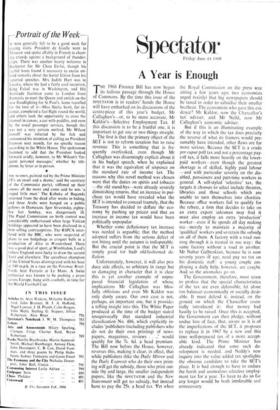A Year is Enough
THE 1966 Finance Bill has now begun its tedious passage through the House of Commons. By the time this issue of the SPECTATOR is in readers' hands the House will have embarked on its discussions of the centre-piece of this year's budget, Mr Callaghan's—or, to be more accurate, Mr Kaldor's—Selective Employment Tax. If this discussion is to be a fruitful one, it is important to get one or two things straight.
The first is that the primary object of the SET is not to reform taxation but to raise revenue. This is something that is fre- quently overlooked, even though Mr Callaghan was disarmingly explicit about it in his budget speech, when he explained that it was the equivalent of sixpence on the standard rate of income tax. The reasons why this novel method was chosen were that the duties on spirits and tobacco —the old stand-bys—were already severely diminishing returns, that an increase in pur- chase tax would have revealed what the SET is intended to conceal (namely, that the Treasury has decided to deflate the eco- nomy by pushing up prices) and that an increase in income tax would have been politically unpopular.
Whether some deflationary tax increase was needed is arguable; that the method adopted suffers from the serious defect of not biting until the autumn is. indisputable. But the crucial point is that the SET is simply good (or bad) old-fashioned de- flation.
Unfortunately, however, it will also pro- duce side effects, so arbitrary in range but so damaging in character that it is clear this is yet another example of unpre- pared financial legislation of whose implications Mr Callaghan was bliss- fully oblivious and even Mr Kaldor was only dimly aware. Our own case is not. perhaps, an important one, but it provides a telling insight into this. The White Paper produced at the time of the budget stated unequivocally that standard industrial classification No. 486, which explicitly in- cludes 'publishers (including publishers who do not do their own printing) of news- papers, magazines, reviews . . .,' would qualify for the 7s. 6d. a head premium. The Bill now before the House, however, reverses this, making it clear, in effect, that while publishers (like the Daily Mirror and the Daily Express) who do their own print- ing will get the subsidy, those who print out- side (by and large, the smaller independent papers, like the SPECTATOR and the New Statesman) will get no subsidy, but instead have to pay the 25s. a head tax. Yet when the Royal Commission on the press was sitting a few years ago, two economists urged (vainly) that big newspapers should be taxed in order to subsidise their smaller brethren. The economists who gave this evi- dence? Mr Kaldor, now the Chancellor's tax 'adviser, and Mr Neild, now Mr Callaghan's economic adviser.
But if this is an illuminating example of the way in which the tax does precisely the reverse of what its framers would pre- sumably have intended, other flaws are far more serious. Because the SET is a crude per caput poll tax and not a percentage pay- roll tax, it falls more heavily on the lower- paid workers—even though the greatest shortage is of skilled, highly paid labour —and with particular severity on the .dis- abled, pensioners and part-time workers in general. A self-styled `selective' tax, the targets it chooses to select include theatres, libraries and those schools which are unable to turn themselves into charities. Because office workers fail to qualify for the rebate, a firm that decides to take on an extra export salesman may find it must also employ an extra 'production' worker—even if he spends all day making tea—merely to maintain a majority of `qualified' workers and so retain the subsidy on all of them. A factory with a road run- ning through it is treated in one way: the same factory without a road in another. Mr Nubar Gulbenkian, because he is now seventy years Of age, need pay no tax on his domestic staff : a young couple em- ploying a daily help, however, are caught. And so the anomalies go on.
The Government, therefore, must cease to profess that the special characteristics of the tax are even defensible, let alone (on balance) economically or socially desir- able. It must defend it, instead, on the ground on which the Chancellor essen- tially introduced it: that money had hastily to be raised. Once this is accepted, the Government can then pledge, without undue loss of face, that, aware as it is of the imperfections of the SET, it proposes to replace it in 1967 by a new and this time well-prepared tax of a more accept- able kind. The Prime Minister has already • indicated that some such de- velopment is needed, and Neddy's new inquiry into the value added tax spotlights the obvious candidate to take the SET's place. It is bad enough to have to endure the harsh and anomalous selective employ- ment tax for a year. To have to do so for any longer would be both intolerable and unnecessary.














































 Previous page
Previous page